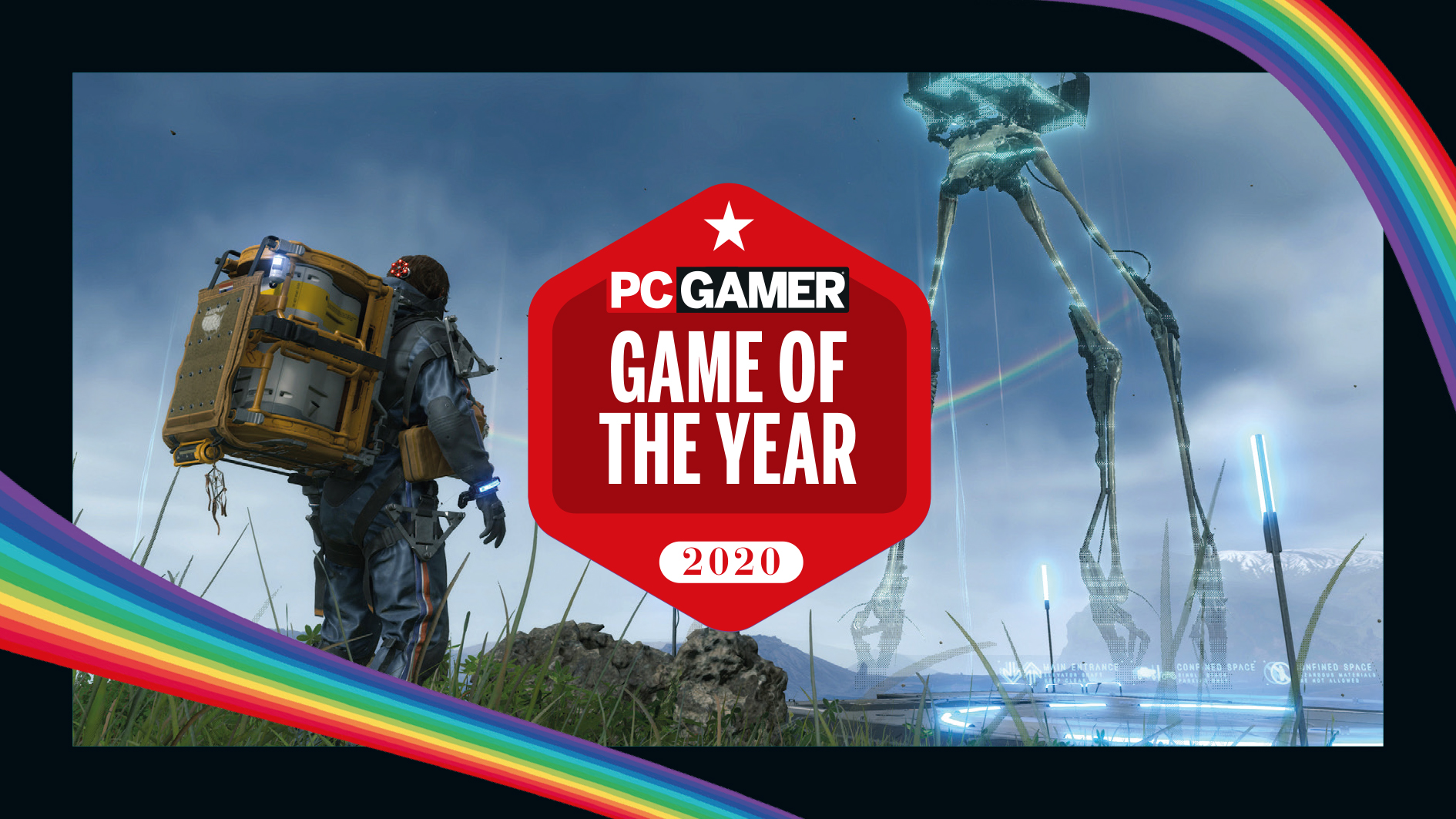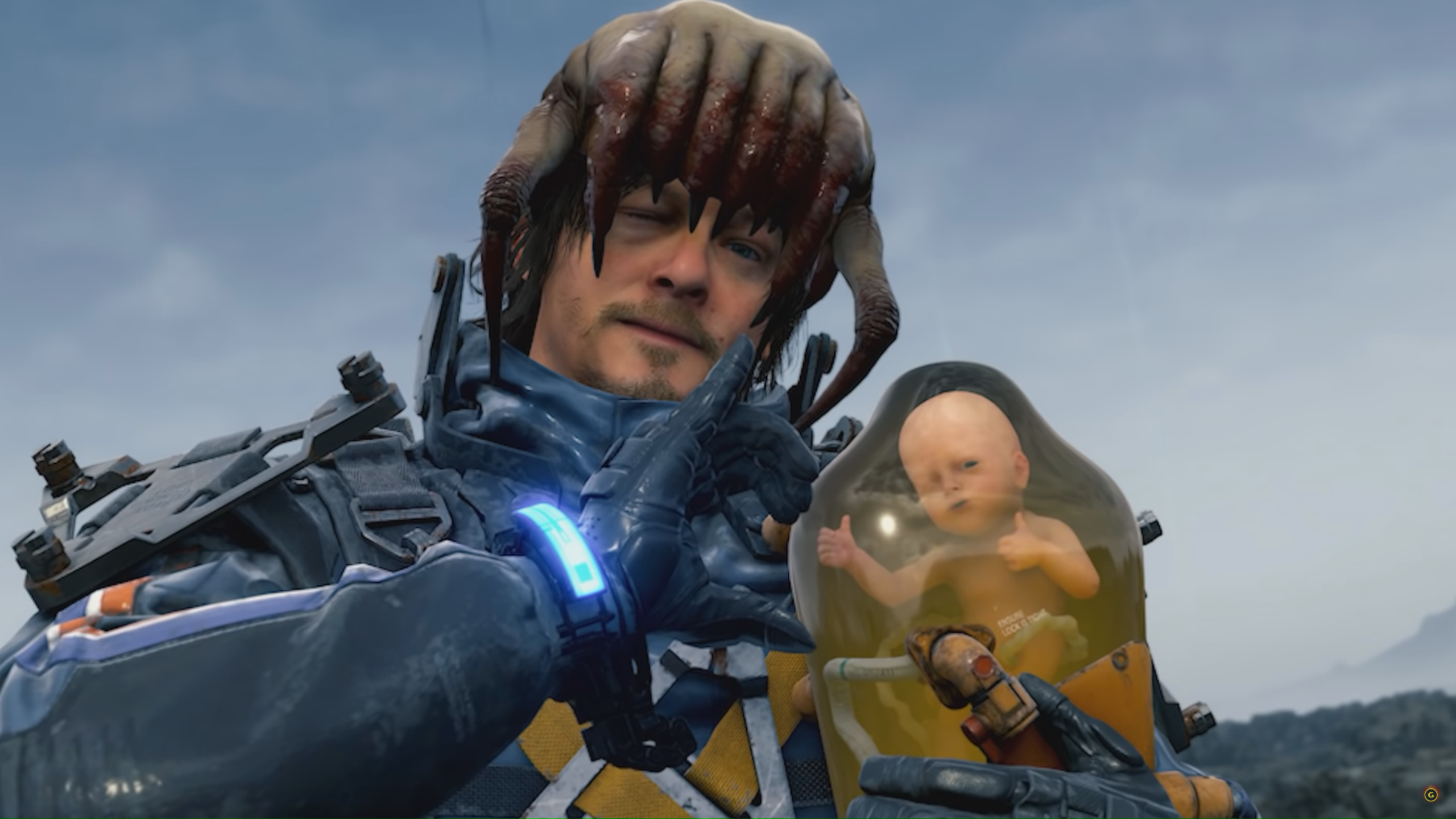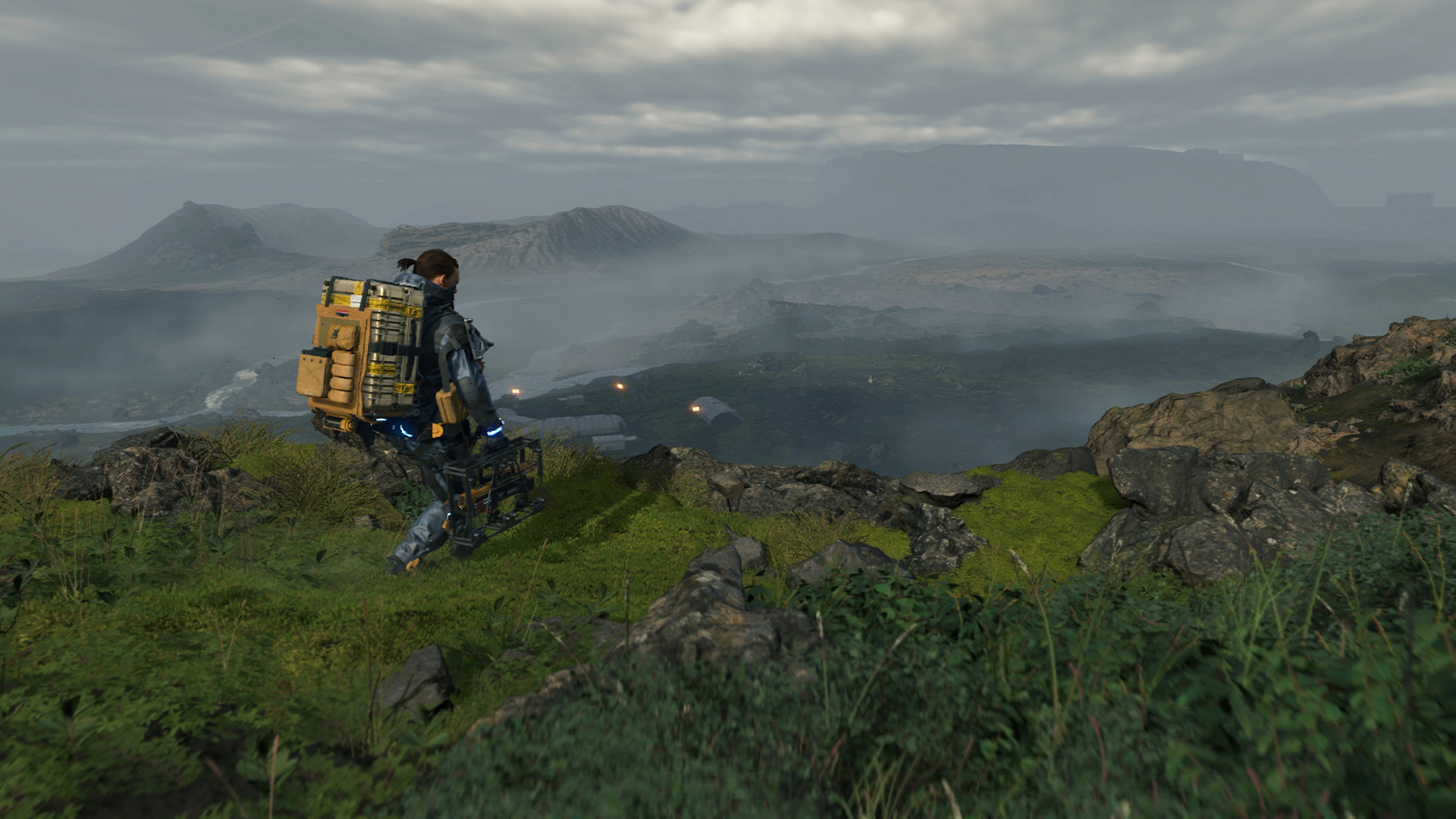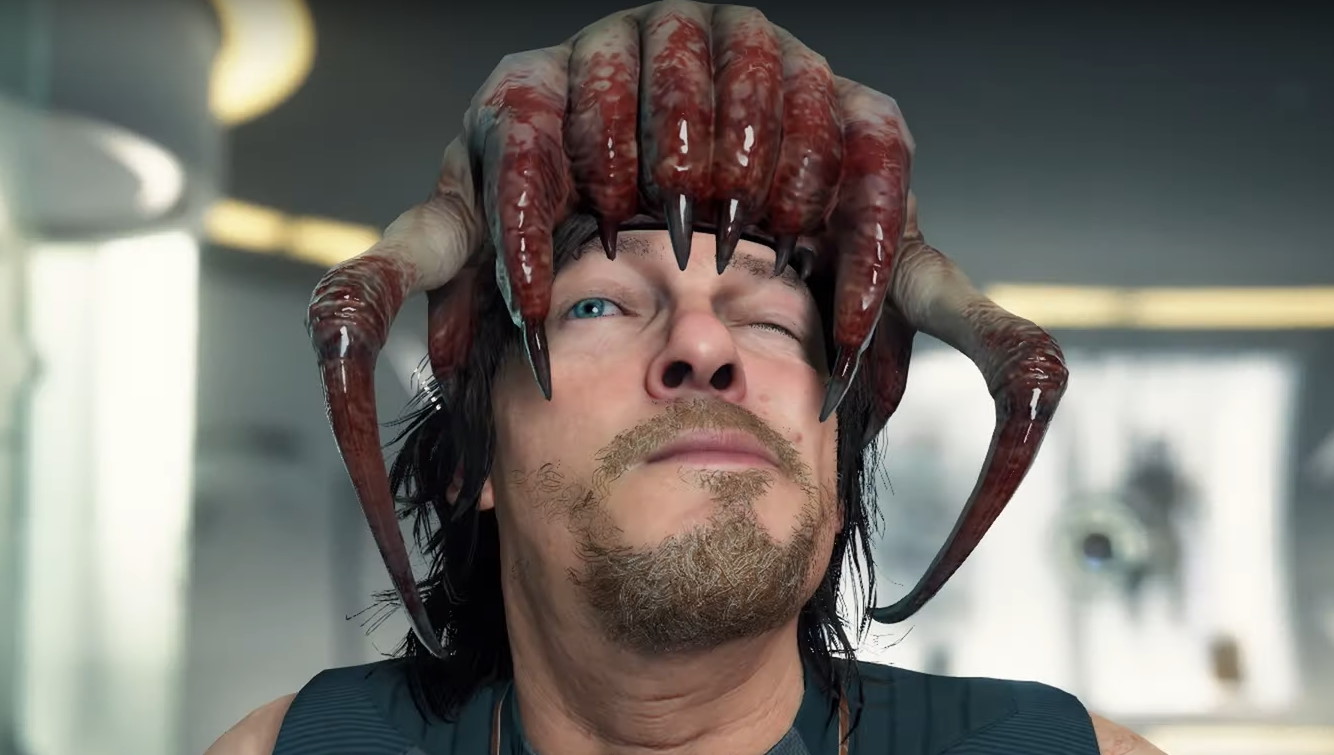
Here it is: PC Gamer's 2020 Game of the Year. If you want to catch up on all of this year's awards and staff picks, visit out GOTY hub.
James Davenport: Cut out the noise around all the odd Kojima-isms, the myth of the nonsensical two-hour long cutscenes, the needless cameos and indulgent winks at the camera—it's all there, and I like it, but it made up a miniscule percentage of my 100-plus hours wandering the American wastes.
What's important: Death Stranding is one of the best games about getting from point A to point B ever made—looking at you Breath of the Wild. It's a game of logistics and physics, resolutely and finally where it belongs on the PC among its simulator siblings, each of Normie's legs given the same attention that SCS Software gives to the 18 tires on a semi-truck.
It's a gorgeous exercise in isolation and serenity, touching on themes of what happens when late-capitalist culture alienates us from one another, and our attempt to chase whatever mindless serotonin high we can in place of those relationships. Death Stranding wants to find purpose in labor, to steer what we accomplish back towards serving one another rather than the ideas of misguided leaders. And it does it so, so well. Every hike up a hill is fraught with tension and danger, both from interdimensional ghosts pinned to reality via inky umbilical cords and… your own clumsy feet.
Death Stranding is about carrying on anyway and trying not to panic when things get worse. Because they will. I've tumbled down cliffs and slid down a river or twelve, but scrambling to adjust and salvage my shipment is just an unexpected augmentation to the challenge. Just another excuse to play around with the dozens of tools supporting the deep traversal and survival systems that make or break every journey. Wrap it all up in morose themes and visually stunning sci-fi concepts, and Death Stranding goes from hiking sim to ineffable mood sim real quick—like Journey but with gravity and consequence.
Once Death Stranding opens up, it's easy to see the Metal Gear Solid 5 stealth sandbox ethos applied to the act of walking here, but with even more trust handed to the player. It was illuminating, talking to other folks who played Death Stranding. We all had similar experiences, these self-imposed goals that rose naturally from the courier sandbox in combination with the asynchronous multiplayer features, where some structures and items are synced between players. We dedicated weekends to finishing highways, hauling comical towers of goods between Death Stranding's highest and most treacherous peaks to build a zipline network.
None of it is even remotely required to finish the campaign, none of it guided by hardcoded questlines or prompts, but knowing you might make someone's own journey a little easier, well, turns out it's a much better reward than XP or any gun skin. The kindness might seem superficial, but there really is no reason for doing this stuff for strangers besides knowing how it feels yourself to eat shit and trip down a hill running from the encroaching black ooze of a BT swarm. Or any other less dramatic variation of tripping on your own feet.
The biggest gaming news, reviews and hardware deals
Keep up to date with the most important stories and the best deals, as picked by the PC Gamer team.
Getting from point A to B is a tenuous trust exercise with physics, propped up by a totally optional trust exercise with strangers. Can you carry a tower of resin up that mountain on your back, through waist-deep snow, all before a time-accelerating blizzard arrives? Do you have enough climbing gear? Thermal pads? Fresh boots? Confidence? Faith? And Why do I explode like a lil' nuke when I die? Only way to find out is by making the slow, steady climb. Baby steps.

Andy Kelly: Death Stranding has completely changed the way I think about traversal in videogames. As much as I love Assassin’s Creed Valhalla, merrily skipping across Norwegian mountains feels, suddenly, quite ridiculous. I don’t think every open world game should go to the same lengths of simulation as Death Stranding, because the exhausting struggle of crossing a river or ascending a mountain peak is very specific to that game. But I would like other developers, inspired by Kojima Productions, to make traversing terrain more involved and considered. It kinda cheapens Valhalla’s majestic Scandinavian peaks when you can scramble up them effortlessly.
I also love how Death Stranding constantly drip-feeds you tools and gadgets to gradually make your job easier. At first it’s just you, your boots, and the elements, but later you get access to floating cargo platforms, electric tricycles, and exoskeletons that let you carry more weight. However, even with these helping hands, getting from place to place is still a challenge. When you encounter one of the game’s many varied, rugged Icelandic landscapes, it feels like a puzzle to be solved. You stand at the foot of a mountain, bulky packages strapped to every inch of your body, and wonder how the hell you’re gonna get to the top. And when you do, after much toil, it feels incredible.

Wes Fenlon: Who cares if Death Stranding was released on consoles in 2019. This is the videogame of the year 2020—and like James said, it's a PC simulation through and through. Like Metal Gear Solid 5 before it, Death Stranding is a game that understands the satisfaction of choosing from a vast array of tools, making a fastidious plan, and executing on it.
And they understand physical comedy. In MGS5, attaching a balloon to a guard (or a bear) and sending them flying into the air was a joy all 500 times I did it. Death Stranding begs you to stack a wobbly tower of cargo on your back and run down a hill so that when you finally lose your balance, you eat shit hard. In a game full of melodrama, falling on your ass is still the most dramatic thing that can happen in Death Stranding.
The talk surrounding Hideo Kojima's games tends to focus on their themes, the ridiculous cutscenes, his obsession with Hollywood. As Chris adeptly pointed out in a Twitter thread highlighting the names of characters in Death Stranding, it can be hard to tell if Kojima's ideas are hilariously tongue-in-cheek or hilariously stupid. In Death Stranding's case, I don't think it matters. 2020 loaned the game added gravitas—its theme of reconnecting a post-apocalyptic, isolated America has real power, even alongside cutscenes with characters named Die Hardman and Sam Porter Bridges.
Again, is the way you frantically mash a "Like" button after encountering another online player's bridge or zipline a clever commentary on social media excess, or something Kojima thought was genuinely cool? I don't know. But it's funny. And it does the job, compelling you to help other players you'll never see, making you grateful for the lifeline someone else built for you over a treacherous stretch of terrain.
"Walking simulator" was once used as a pejorative, and it's almost like Death Stranding took that as a challenge. It's a deep, satisfying sim about walking up hills, and somehow an affecting story of human connection, too, even when you're walking around with a baby named BB strapped to your chest.

Jody Macgregor: It's an entire game about terrain, what could be more PC gaming than that? How about the fact if it has an entire side story about NPCs who are obsessed with Valve games?
Every now and then you get an email from a Portal fan who sends you off in search of missing companion cubes—which oddly fits with Death Stranding's idea that post-apocalyptic survivors are really into pre-Stranding pop culture, from Seven Samurai to the God of War soundtrack. Your reward for finding the companion cubes is Valve-themed merch, like Gordon Freeman's glasses, a lambda-covered truck, or a wearable headcrab that you might forget you have on until it shows up in a serious cutscene. I shouldn't need to tell anyone here how much that rules.
The collective PC Gamer editorial team worked together to write this article. PC Gamer is the global authority on PC games—starting in 1993 with the magazine, and then in 2010 with this website you're currently reading. We have writers across the US, UK and Australia, who you can read about here.


